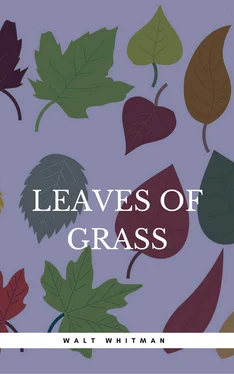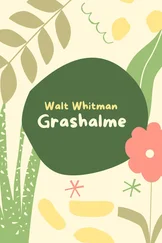Walt Whitman - Leaves of Grass
Здесь есть возможность читать онлайн «Walt Whitman - Leaves of Grass» — ознакомительный отрывок электронной книги совершенно бесплатно, а после прочтения отрывка купить полную версию. В некоторых случаях можно слушать аудио, скачать через торрент в формате fb2 и присутствует краткое содержание. ISBN: , Жанр: Языкознание, Критика, на английском языке. Описание произведения, (предисловие) а так же отзывы посетителей доступны на портале библиотеки ЛибКат.
- Название:Leaves of Grass
- Автор:
- Жанр:
- Год:неизвестен
- ISBN:9782377930524
- Рейтинг книги:4 / 5. Голосов: 1
-
Избранное:Добавить в избранное
- Отзывы:
-
Ваша оценка:
- 80
- 1
- 2
- 3
- 4
- 5
Leaves of Grass: краткое содержание, описание и аннотация
Предлагаем к чтению аннотацию, описание, краткое содержание или предисловие (зависит от того, что написал сам автор книги «Leaves of Grass»). Если вы не нашли необходимую информацию о книге — напишите в комментариях, мы постараемся отыскать её.
Leaves of Grass — читать онлайн ознакомительный отрывок
Ниже представлен текст книги, разбитый по страницам. Система сохранения места последней прочитанной страницы, позволяет с удобством читать онлайн бесплатно книгу «Leaves of Grass», без необходимости каждый раз заново искать на чём Вы остановились. Поставьте закладку, и сможете в любой момент перейти на страницу, на которой закончили чтение.
Интервал:
Закладка:
Not a grave of the murdered for freedom, but grows seed for freedom, in its turn to bear seed,
Which the winds carry afar and re-sow, and the rains and the snows nourish.
Not a disembodied spirit can the weapons of tyrants let loose,
But it stalks invisibly over the earth, whispering, counseling, cautioning.
Liberty! let others despair of you! I never despair of you.
Is the house shut? Is the master away?
Nevertheless be ready—be not weary of watching,
He will soon return—his messengers come anon.
17—Poem of The Heart of The Son of Manhattan Island
1856:17
Who has gone farthest? For I swear I will go farther;
And who has been just? For I would be the most just person of the earth;
And who most cautious? For I would be more cautious;
And who has been happiest? O I think it is I! I think no one was ever happier than I;
And who has lavished all? For I lavish constantly the best I have;
And who has been firmest? For I would be firmer;
And who proudest? For I think I have reason to be the proudest son alive—for I am the son of the brawny and tall-topt city;
And who has been bold and true? For I would be the boldest and truest being of the universe;
And who benevolent? For I would show more benevolence than all the rest;
And who has projected beautiful words through the longest time? By God! I will outvie him! I will say such words, they shall stretch through longer time!
And who has received the love of the most friends? For I know what it is to receive the passionate love of many friends;
And to whom has been given the sweetest from women, and paid them in kind? For I will take the like sweets, and pay them in kind;
And who possesses a perfect and enamored body? For I do not believe any one possesses a more perfect or enamored body than mine;
And who thinks the amplest thoughts? For I will surround those thoughts;
And who has made hymns fit for the earth? For I am mad with devouring ecstasy to make joyous hymns for the whole earth!
18—Poem of The Last Explanation of Prudence
1856:18
All day I have walked the city and talked with my friends, and thought of prudence,
Of time, space, reality—of such as these, and abreast with them, prudence.
After all, the last explanation remains to be made about prudence,
Little and large alike drop quietly aside from the prudence that suits immortality.
The soul is of itself,
All verges to it, all has reference to what ensues,
All that a person does, says, thinks, is of consequence,
Not a move can a man or woman make, that affects him or her in a day, month, any part of the direct life-time, or the hour of death, but the same affects him or her onward afterward through the indirect life-time.
The indirect is more than the direct,
The spirit receives from the body just as much as it gives to the body, if not more.
Not one word or deed—not venereal sore, discoloration, privacy of the onanist, putridity of gluttons or rum-drinkers, peculation, cunning, betrayal, murder, seduction, prostitution, but has results beyond death, as really as before death.
Charity and personal force are the only investments worth anything.
No specification is necessary—all that a male or female does, that is vigorous, benevolent, clean, is so much profit to him or her in the unshakable order of the universe, and through the whole scope of it forever.
Who has been wise, receives interest,
Savage, felon, President, judge, prostitute, farmer, sailor, mechanic, young, old, it is the same,
The interest will come round—all will come round.
Singly, wholly, to affect now, affected their time, will forever affect, all of the past, and all of the present, and all of the future,
All the brave actions of war and peace,
All help given to relatives, strangers, the poor, old, sorrowful, young children, widows, the sick, and to shunned persons,
All furtherance of fugitives, and of the escape of slaves,
All self-denial that stood steady and aloof on wrecks, and saw others fill the seats of the boats,
All offering of substance or life for the good old cause, or for a friend’s sake, or opinion’s sake,
All pains of enthusiasts, scoffed at by their neighbors,
All the limitless sweet love and precious suffering of mothers,
All honest men baffled in strifes recorded or unrecorded,
All the grandeur and good of ancient nations whose fragments we inherit,
All the good of the hundreds of ancient nations unknown to us by name, date, location,
All that was ever manfully begun, whether it succeeded or no,
All suggestions of the divine mind of man, or the divinity of his mouth, or the shaping of his great hands;
All that is well thought or said this day on any part of the globe—or on any of the wandering stars, or on any of the fixed stars, by those there as we are here,
All that is henceforth to be thought or done by you, whoever you are, or by any one,
These inure, have inured, shall inure, to the identities from which they sprang, or shall spring.
Did you guess anything lived only its moment?
The world does not so exist—no parts palpable or impalpable so exist,
No consummation exists without being from some long previous consummation, and that from some other, without the farthest conceivable one coming a bit nearer the beginning than any.
Whatever satisfies souls is true,
Prudence satisfies the craving and glut of souls.
Itself finally satisfies the soul,
The soul has that measureless pride which revolts from every lesson but its own.
Now I give you an inkling,
Now I breathe the word of the prudence that walks abreast with time, space, reality,
That answers the pride which refuses every lesson but its own.
What is prudence, is indivisible,
Declines to separate one part of life from every part,
Divides not the righteous from the unrighteous, or the living from the dead,
Matches every thought or act by its correlative,
Knows no possible forgiveness or deputed atonement,
Knows that the young man who composedly periled his life and lost it, has done exceeding well for himself, without doubt,
That he who never periled his life, but retains it to old age in riches and ease, has probably achieved nothing for himself worth mentioning;
Knows that only the person has learned, who has learned to prefer results,
Who favors body and soul the same,
Who perceives the indirect assuredly following the direct,
Who in his spirit in any emergency whatever neither hurries or avoids death.
19—Poem of The Singers, and of The Words of Poems
1856:19
Perfect sanity shows the master among philosophs,
Time, always without flaw, indicates itself in parts,
What always indicates the poet, is the crowd of the pleasant company of singers, and their words,
The words of the singers are the hours or minutes of the light or dark—but the words of the maker of poems are the complete light and dark,
The maker of poems settles justice, reality, immortality,
His insight and power encircle things and the human race,
He is the glory and extract, thus far, of things and of the human race.
Интервал:
Закладка:
Похожие книги на «Leaves of Grass»
Представляем Вашему вниманию похожие книги на «Leaves of Grass» списком для выбора. Мы отобрали схожую по названию и смыслу литературу в надежде предоставить читателям больше вариантов отыскать новые, интересные, ещё непрочитанные произведения.
Обсуждение, отзывы о книге «Leaves of Grass» и просто собственные мнения читателей. Оставьте ваши комментарии, напишите, что Вы думаете о произведении, его смысле или главных героях. Укажите что конкретно понравилось, а что нет, и почему Вы так считаете.












